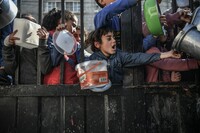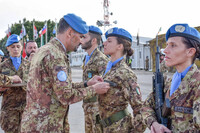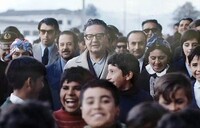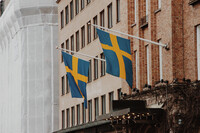Bush chiese a Clarke di trovare le prove del coinvolgimento dell'Iraq nell'attentato dell' 11/9/01 gia' il giorno dopo
President Asked Aide to Explore Iraq Link to 9/11
By ERIC LICHTBLAU
Published: March 29, 2004
WASHINGTON, March 28 — The White House acknowledged Sunday that on the day after the terrorist attacks of Sept. 11, 2001, President Bush asked his top counterterrorism adviser, Richard A. Clarke, to find out whether Iraq was involved.
Mr. Bush wanted to know "did Iraq have anything to do with this? Were they complicit in it?" Condoleezza Rice, the president's national security adviser, recounted in an interview on CBS' "60 Minutes."
Mr. Bush was not trying to intimidate anyone to "produce information," she said. Rather, given the United States' "actively hostile relationship" with Iraq at the time, he was asking Mr. Clarke "a perfectly logical question," Ms. Rice said.
The conversation — which the White House suggested last week had never taken place — centers on perhaps the most volatile charge Mr. Clarke has made public in recent days: that the Bush White House became fixated on Iraq and Saddam Hussein at the expense of focusing on Al Qaeda.
In his new book, "Against All Enemies," Mr. Clarke recounts that the president pulled him and several other aides into the White House Situation Room on the evening of Sept. 12, 2001, and instructed them "to go back over everything, everything. See if Saddam did this. See if he's linked in any way."
Mr. Clarke was incredulous, he said in the book. "But, Mr. President, Al Qaeda did this," he said he responded.
Mr. Bush answered: "I know, I know, but . . . see if Saddam was involved. Just look. I want to know any shred," according to Mr. Clarke's account. Mr. Clarke added in later interviews that he felt he was being intimidated to find a link between the attacks and Iraq.
Last week, the White House said it had no record that Mr. Bush had even been in the Situation Room that day and said the president had no recollection of such a conversation. Although administration officials stopped short of denying the account, they used it to cast doubt on Mr. Clarke's credibility as they sought to debunk the charge that the administration played down the threat posed by Al Qaeda in the months before the Sept. 11 attacks and worried instead about Iraq.
The political fallout over Mr. Clarke's charges intensified on Sunday, as he and four of the president's top advisers traded jabs in separate televised appearances over the question of whether the Bush White House did enough to deter terrorism before Sept. 11.
Mr. Clarke, in an interview on NBC's "Meet the Press," urged the Bush administration to make public the testimony he gave in 2002 to a joint Congressional committee that was investigating the attacks.
He said declassifying his testimony — as well as other memorandums and materials from Ms. Rice and the administration — would show he had long complained that the Bush administration failed to take aggressive action against Al Qaeda before the Sept. 11 attacks.
In particular, he urged the administration to make public a memorandum on counterterrorism initiatives that he wrote just days after Mr. Bush took office, as well as a counterterrorism plan that the White House ultimately approved more than seven months later, a week before the attacks.
"Let's see if there's any difference between those two, because there isn't," he said. "And what we'll see when we declassify what they were given on Jan. 25 and what they finally agreed to on Sept. 4 is that they are basically the same thing, and they wasted months when we could have had some action."
Meanwhile, members of the commission investigating the Sept. 11 attacks pressed Ms. Rice to appear publicly before the commission to explain the events leading up to the attack.
Ms. Rice "has appeared everywhere except my local Starbucks," Richard Ben-Veniste, a member of the commission, said in an interview. "For the White House to continue to refuse to make her available simply does not make sense."
Ms. Rice met with the commission in February to discuss pre-Sept. 11 initiatives, but an official involved in that meeting said the White House insisted that she not be put under oath and that the session not be recorded. Commissioners were allowed to take notes, but no transcript of her comments is thought to exist.
The White House says that having the national security adviser testify in public would compromise executive privilege and the president's ability to get confidential advice
Articoli correlati
 Sullo sfondo emerge il grande business della guerra
Sullo sfondo emerge il grande business della guerraFame, bombe e sfollamenti forzati: queste le armi del governo israeliano contro Gaza, Libano e…
Netanyahu ha bombardato ospedali e scuole, fatto morire di fame bambini, distrutto infrastrutture e alloggi e reso la vita invivibile a Gaza22 ottobre 2024 - Rossana De Simone Israele sta violando la risoluzione 1701 del Consiglio di Sicurezza ONU votata anche dagli USA
Israele sta violando la risoluzione 1701 del Consiglio di Sicurezza ONU votata anche dagli USAIl ruolo dei Caschi Blu dell'ONU in Libano: storia e attualità
Il governo israeliano "viola la risoluzione ONU", lo dice la missione ONU Unifil. E il governo Usa? Sostiene l'invasione del Libano, dopo aver dato lezioni di diritto internazionale a Putin e al mondo intero.1 ottobre 2024 - Alessandro Marescotti Le parole dello scrittore cileno Jorge Baradit Morales
Le parole dello scrittore cileno Jorge Baradit Morales"Salvador Allende era un pacifista"
"Era un pacifista che, nei momenti in cui trionfava la via armata, insisteva che la via era la pace e la democrazia. Oggi Salvador Allende è una figura mondiale al pari di Martin Luther King, Mahatma Gandhi e altri che 'in nome dell’amore' per l’umanità furono assassinati dai mercanti di morte".27 giugno 2024 - Alessandro Marescotti Ieri il parlamento di Stoccolma ha approvato il controverso patto DCA
Ieri il parlamento di Stoccolma ha approvato il controverso patto DCACon l'appoggio dell'estrema destra passa il nuovo patto militare fra Stati Uniti e Svezia
La Società svedese per la pace e l'arbitrato ha criticato duramente l'accordo, sottolineando che, a differenza di patti simili firmati con Norvegia e Danimarca, il DCA svedese non contiene riserve contro l'introduzione o lo stazionamento di armi nucleari.19 giugno 2024 - Redazione PeaceLink
Sociale.network